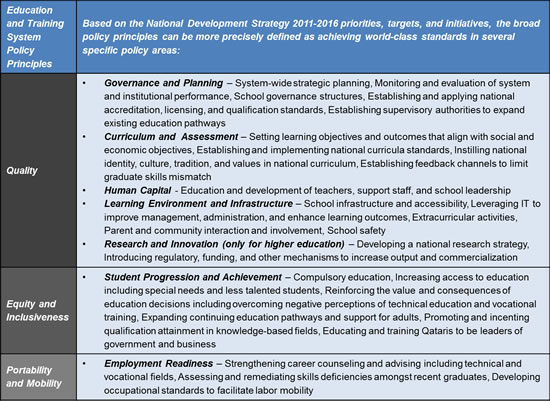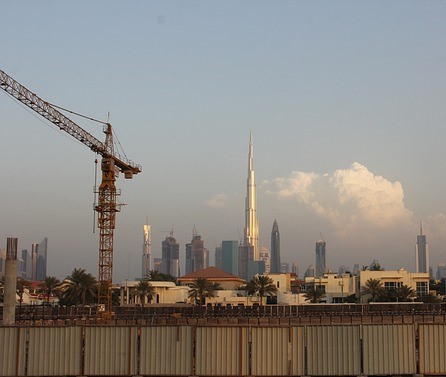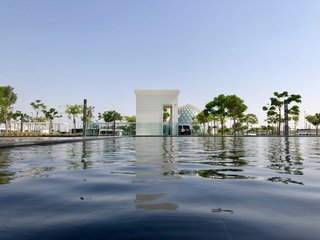How the Qatar National Vision 2030 advances a broad vision for the education and training system
- In January 2007, the Planning Council of Qatar sought the assistance of the World Bank to perform a knowledge economy assessment and articulate a vision for Qatar
- The Qatari government is in a unique position of coordinating outputs with economic development needs without relying on external financial assistance
Knowledge-based economic development has become closely intertwined with national competitiveness and economic policies that support integration and diversification, innovation, technology development, entrepreneurship, workforce skills development and job creation, adoption of high performance organizational structures, and ICT infrastructure development (Planning 2010).
Through the engagement of international organizations such as the World Bank and the UN with the region, the concept of knowledge-based economy has taken on an expanded meaning in the Arab region.
The Arabized concept of knowledge economy is also fused with other development challenges not part of the Western conception of the term such as large-scale education and training system reform; environmental sustainability; social and cultural development including issues surrounding identity, language, equality; political participation and reform; and healthcare reform (Program 2002; Program 2003; United Nations Educational 2005; Bank 2007; Foundation and Program 2009).
Influenced by the gradual adoption of knowledge-economy as a widespread regional policy goal beginning in the early 1990s and the work of international organizations, in January 2007 the Planning Council of Qatar and Qatar Foundation sought the assistance of the World Bank to perform a knowledge economy assessment and articulate a vision for Qatar.
In general, there is a lack of an overall strategy for workforce development in Qatar.
At the time, a background analysis for the World Bank report observed the following education and training issues “few links and formal relationships between the training institutions and the needs of the labor market; education and training institutions are highly separated with little coordination; no linkages between training and job career prospect; and most of the training centers lack human and financial resources (Institute 2007).”
The Qatar National Vision 2030 advances a broad vision for the education and training system: “Qatar aims to build a modern world-class educational system that provides students with a first-rate education, comparable to that offered anywhere in the world.” The National Development Strategy 2011-2016 describes the underlying thrust of the education and training system in both economic and socio-cultural outcomes.
In terms of fostering economic development towards a diversified, knowledge-based economy, innovation in science, medicine, and industry is emphasized along with upgrading and deepening the education, knowledge, and skills of Qataris for increased private sector employment participation.
In terms of catalyzing socio-cultural outcomes, the skills formation system is linked with outcomes such as religious, moral, and ethical values, national identity, preservation of traditions and cultural heritage, a well-rounded and engaged citizenry, a cohesive, participatory society, improved decisions about health, marriage, parenting, and social responsibility (Planning 2011).
Primarily receiving technical assistance for institutional capacity development as aid from international organizations, the Qatari government, through the Supreme Education Council, serves as the regulator, provider, and funder of the education and training system while playing a strong role in defining industrial economic development policy.
Thus, the Qatari government is in a unique position of coordinating education and training outputs with economic development needs without relying on external financial assistance.
In this respect, the Qatar National Vision sets three system-wide education and training policy objectives to achieve world-class standards:
By defining specific policy areas for education reform, a performance management framework was devised to track delivery upon goals set out in the National Development Strategy at two levels to ensure that empirically supported socio-cultural and economic benefits attributable to education and training are achieved:
- Policy-based key performance indicators measure system performance relative to the achievement of the overarching policy aims of quality, equity, and portability;
- Output KPIs measure the effectiveness of the education and training system in terms of achieving academic, social, and economic outcomes which are precursors to the future development of Qatar.










































